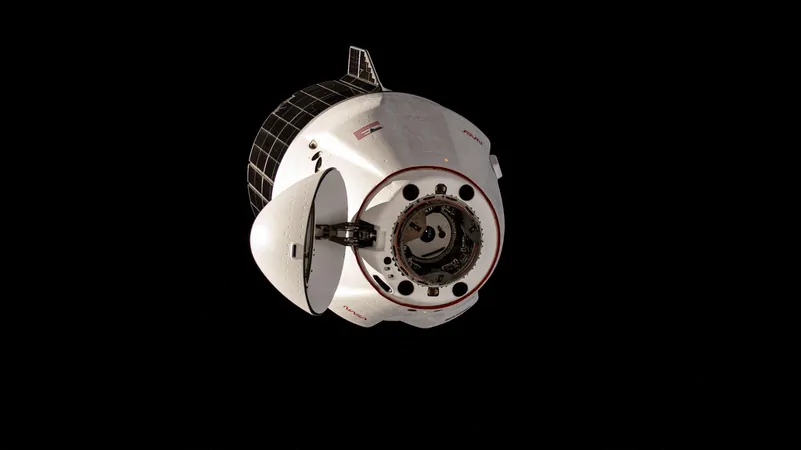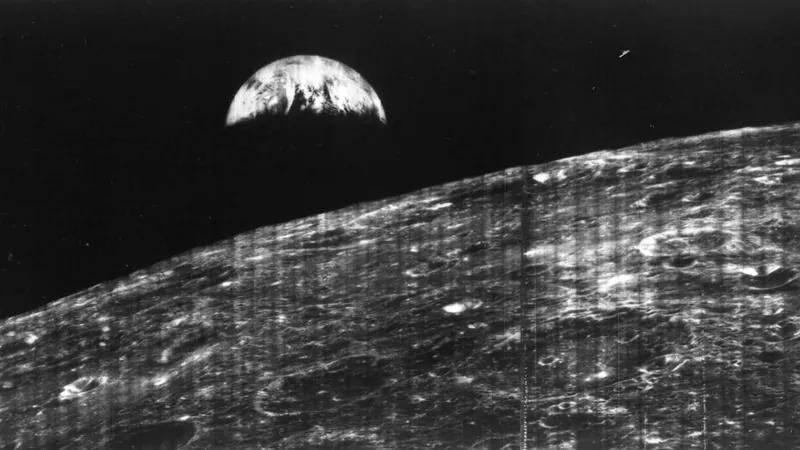
SpaceX Launches Mission to Revolutionize Medicine in Space
2025-08-25
Author: Jacob
A Groundbreaking Stem Cell Experiment Heads to the ISS
In a thrilling advancement for medical science, a stem cell experiment destined for the International Space Station (ISS) is soaring into orbit aboard SpaceX's Falcon 9 rocket. This mission not only marks the 50th journey of a Dragon spacecraft to the ISS but also holds the potential to unlock transformative treatments for devastating conditions like bone loss and brain injuries.
Mission Overview and Significant Cargo
Launched from Cape Canaveral, Florida, early Sunday, the Dragon CRS-33 mission is transporting over 5,000 pounds of essential supplies, equipment, and scientific research. At the heart of this cargo is a pioneering study led by Dr. Abba Zubair of the Mayo Clinic, which could redefine our understanding of bone health and disease treatment.
Microgravity's Impact on Bone Health
Dr. Zubair's research aims to investigate how microgravity affects stem cells responsible for bone formation. The team is particularly interested in a protein called IL-6, which plays a key role in bone density regulation. By exploring the impact of this protein, they hope to develop methods to combat bone loss in astronauts that could also illuminate treatments for osteoporosis and other conditions on Earth.
"If we can inhibit the impact of microgravity and slow or prevent bone loss, it could lead to groundbreaking treatments for both astronauts and individuals with conditions like osteoporosis," stated Dr. Zubair.
A Broad Vision for Future Therapies
This project could eventually pave the way for therapies addressing a broad spectrum of conditions, from strokes and brain injuries to blood disorders and cancers. Dr. Zubair has been advancing this vision for over 20 years at the Mayo Clinic, and now, it’s reaching there with the ISS as a launchpad for discovery.
SpaceX's Expanding Role in Space Research
As SpaceX continues to play a pivotal role in ISS operations, the CRS-33 mission extends beyond traditional cargo resupply missions. For nearly five months, the Dragon capsule will support the station’s altitude maintenance, an essential duty typically performed by Russian spacecraft.
The Future of Medicine in Space
Dr. Zubair’s ongoing research, now in its fourth flight aboard a Dragon capsule, aims to fundamentally alter the approach to bone health in microgravity. Insights gleaned from this experiment could revolutionize treatments for chronic illnesses on Earth. In addition to Zubair's experiment, the Dragon capsule carries innovative medical technologies like a bioprinted nerve-repair device and a project testing metal 3D printing in space.
Heidi Parris, NASA’s associate program scientist, says, "This research could change the narrative for treating bone health, not only for astronauts but for millions on Earth facing chronic diseases."
Future Returns and ISS Milestones
Scheduled to return in December, the Dragon capsule will bring back vital samples from this groundbreaking research, reinforcing the ISS's legacy over 25 years of human habitation. SpaceX has supported this journey with over 300,000 pounds of cargo and more than 1,000 scientific investigations.
Sarah Walker, SpaceX's director of Dragon Mission Management, expresses excitement about the evolving relationship with the ISS: "We’re becoming an increasingly integral part of the station’s ecosystem. As we look ahead, preparations for the ISS’s future and eventual deorbiting in 2030 are well underway."
A New Era of Medical Innovation in Space
As missions to the ISS continue to grow in duration and complexity, this mission marks a significant leap toward harnessing the unique conditions of microgravity to tackle some of Earth's most pressing health challenges. SpaceX's continued commitment to innovation fuels the hope that groundbreaking medical solutions may soon emerge from the vastness of space.









 Brasil (PT)
Brasil (PT)
 Canada (EN)
Canada (EN)
 Chile (ES)
Chile (ES)
 Česko (CS)
Česko (CS)
 대한민국 (KO)
대한민국 (KO)
 España (ES)
España (ES)
 France (FR)
France (FR)
 Hong Kong (EN)
Hong Kong (EN)
 Italia (IT)
Italia (IT)
 日本 (JA)
日本 (JA)
 Magyarország (HU)
Magyarország (HU)
 Norge (NO)
Norge (NO)
 Polska (PL)
Polska (PL)
 Schweiz (DE)
Schweiz (DE)
 Singapore (EN)
Singapore (EN)
 Sverige (SV)
Sverige (SV)
 Suomi (FI)
Suomi (FI)
 Türkiye (TR)
Türkiye (TR)
 الإمارات العربية المتحدة (AR)
الإمارات العربية المتحدة (AR)